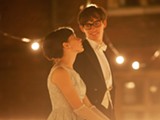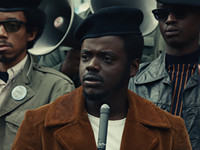[
{
"name": "500x250 Ad",
"insertPoint": "5",
"component": "15667920",
"parentWrapperClass": "",
"requiredCountToDisplay": "1"
}
]
Though difficult to believe in a time when significant numbers of Americans and an entire political party reject the findings of science, a theoretical physicist occupies a place in the firmament usually reserved for international celebrities, rock stars, and movie actors. Stephen Hawking's most famous book, "A Brief History of Time," has sold more than 10 million copies, a number beyond the aspirations of even the most ambitious literary schlockmeister. His personal story, as most people know, makes him a perhaps more compelling figure than his contributions to human knowledge.
Like many biopics, "The Theory of Everything" shows an individual's triumph over adversity, in Stephen Hawking's case a diagnosis of amyotrophic lateral sclerosis, in this country called Lou Gehrig's disease, in Britain, motor neuron disease, with a predicted life span of two years. When the condition appeared, Hawking was a brilliant graduate student at Cambridge University, on the brink of a great career. Based on a book by Hawking's ex-wife Jane, the movie shows how the couple coped with his tragic circumstance; it also shows not only his survival but his great success as a major contributor to theoretical physics.
The film moves in a predictable manner, with familiar images of student life against the picturesque background of Cambridge -- beer in pubs, some youthful lightheartedness, academic gowns, lots of tweed jackets -- and some romantic moments involving the meeting and subsequent relationship between Stephen (Eddie Redmayne) and Jane (Felicity Jones). Despite his father's advice and Stephen's disease, Jane marries him and the two of them embark on an extraordinary challenge.
As Stephen's disease progresses, his career advances, and his theorizing about the origins of the universe earns him the admiration of his peers and later, worldwide fame. At the same time, Jane must deal with the immensely complicated and demanding life that anyone caring for a disabled partner with increasing debility over time knows only too well. He moves from one cane to two, to a walker, then a wheelchair; when an operation to save him from pneumonia robs him of speech, he initially communicates by blinking, then by means of a computer that provides him with a robotic but understandable voice.
In a comic moment, Jane's mother suggests she join the church choir to relieve some of the terrible stress of her life, which brings the couple the devoted and generous friendship of the choir director, Jonathan Hellyer Jones (Charlie Cox). Jonathan helps both of them, but his relationship with Jane raises other issues, resolved only after a number of other complications over the passage of several years.
The movie obviously provides a special showcase for the talents of Eddie Redmayne, who spends most of its length in a wheelchair, his body and face twisted, his speech increasingly distorted, his world and life tragically limited. He meets the demands of the part, which require what must have been an exhausting physical and emotional impersonation. Redmayne looks very like the physicist, projecting a range of emotions within the strictures of his character, creating a truly remarkable performance.
Typically in English movies, the whole cast performs with great skill and conviction. In a part almost as difficult as Redmayne's, Felicity Jones must express the complex emotions of a caregiver -- grief, sympathy, frustration, resentment, guilt, despair -- with a properly British understatement. She also initiates the continuing subtext of the film as well, the conflict between the cosmologist and the Christian, each attempting to understand how the universe began.
"The Theory of Everything" refers to Hawking's attempts to explain the origin and eventual end of the universe, an ambitious and ongoing project. His survival for some 50 years after his diagnosis suggests that the power of his genius may also have provided the spark of life that enabled him to defy the doctors and the odds and continue his work. In a time when public figures actually deride the work of science, his story, like "A Beautiful Mind," exalts the human intellect and its possibilities. The movie is also a story of courage and heroism, both Hawking's and Jane's, a tribute to the tenacity and sacrifice of both partners facing an unimaginably daunting life, triumphing over tragedy, a tribute to the human spirit itself.
Speaking of...
Latest in Movie Reviews
More by George Grella
-

Film Review: "Cake"
Jan 26, 2015 -

Film Review: "American Sniper"
Jan 19, 2015 -

Film Review: "Inherent Vice"
Jan 12, 2015 - More »









